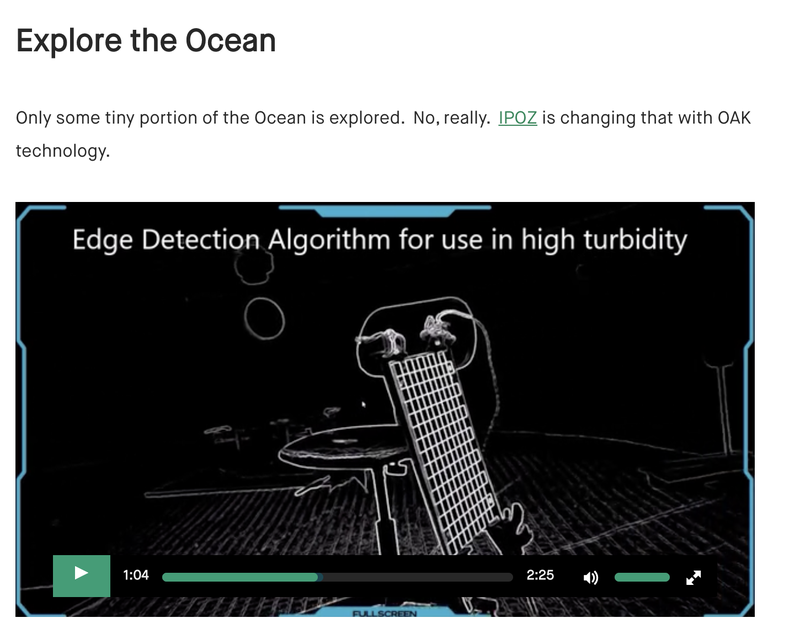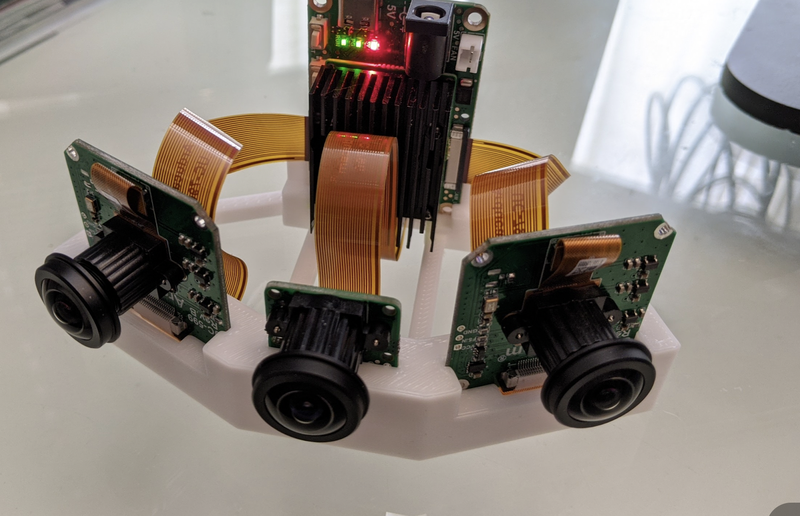Just like a trained safety personnel can look out for.
 to tag on to Dan's question, are there use cases being discussed/debated that are non-human task/automation centered? I don't have examples or inkling what other cases can be used for SpatialAI
to tag on to Dan's question, are there use cases being discussed/debated that are non-human task/automation centered? I don't have examples or inkling what other cases can be used for SpatialAI

 So maybe an advanced security system that, instead of sensing doors or windows open and close with switches, watch for, say, someone climbing into a window.
So maybe an advanced security system that, instead of sensing doors or windows open and close with switches, watch for, say, someone climbing into a window.
 For example, fall detection and can be privacy-preserving.
For example, fall detection and can be privacy-preserving.
 Yes, good example Dan.
Yes, good example Dan.
 @Erik - can you find the machine safety demo and share it here too?
@Erik - can you find the machine safety demo and share it here too?
 or to detect when someone is too close to an operative robot. Spatial AI can detect where robot hand is, and where person is, and measure distance between them, demo here: https://github.com/luxonis/depthai-experiments/tree/master/gen2-human-machine-safety#gen2-human-machine-safety
or to detect when someone is too close to an operative robot. Spatial AI can detect where robot hand is, and where person is, and measure distance between them, demo here: https://github.com/luxonis/depthai-experiments/tree/master/gen2-human-machine-safety#gen2-human-machine-safety
 Thanks!
Thanks!
 @ump - yes. There are all sorts of applications which are not about replacing humans.
@ump - yes. There are all sorts of applications which are not about replacing humans.
 And many of the problems are just unsolved problems, which were thought unsolvable.
And many of the problems are just unsolved problems, which were thought unsolvable.
 One good example is having OAK-based sensors on fishing nets.
One good example is having OAK-based sensors on fishing nets.
 Or produce Gcode on the fly for robotic arms
Or produce Gcode on the fly for robotic arms
 To make a smart fishing net.
To make a smart fishing net.
 To prevent bycatch. Which is just unsolved now.
To prevent bycatch. Which is just unsolved now.
 The only way bycatch is discovered is by bringing up the net - and discovering (with horror) all the dead endangered species that are in it.
The only way bycatch is discovered is by bringing up the net - and discovering (with horror) all the dead endangered species that are in it.
 Is that catching unintended species?
Is that catching unintended species?
 Yes.
Yes.
 With Spatial AI, you can get the species, size, and locations of all of them. Underwater and communciated like a 56k modem back to the ship (through sound transduction).
With Spatial AI, you can get the species, size, and locations of all of them. Underwater and communciated like a 56k modem back to the ship (through sound transduction).
 So you can just pull the nets or move them when species that are too small (common problem) or are endangered (or both) are present.
So you can just pull the nets or move them when species that are too small (common problem) or are endangered (or both) are present.
 I am working on "spinal cord injury" currently. You need rigged 3D models of the person for exoskeletons. You need 3D imaging real time of nerve activity. You need 3D monitoring of muscles. If you use the existing muscles by stimulation you need the models of the target area, the fields used, and careful planning to keep a unique human balanced. It is almost all 3D.
I am working on "spinal cord injury" currently. You need rigged 3D models of the person for exoskeletons. You need 3D imaging real time of nerve activity. You need 3D monitoring of muscles. If you use the existing muscles by stimulation you need the models of the target area, the fields used, and careful planning to keep a unique human balanced. It is almost all 3D.
 Cool applications! Thanks Brandon
Cool applications! Thanks Brandon
 There have to be significant problems with turbidity and general poor-visibility conditions underwater in most places. At least I'd imagine so
There have to be significant problems with turbidity and general poor-visibility conditions underwater in most places. At least I'd imagine so
 Thanks! A bunch more applications are in the materials below as well @ump :
Thanks! A bunch more applications are in the materials below as well @ump :
https://opencv.org/opencv-ai-competition-2021/
https://www.kickstarter.com/projects/opencv/opencv-ai-kit-oak-depth-camera-4k-cv-edge-object-detection/description
Great questions!
![]() thought. megahertz-range ultrasound transducer array. augment the vision with 3d sonar.
thought. megahertz-range ultrasound transducer array. augment the vision with 3d sonar.
 @Dan Maloney - yes, the built-in edge filter helps with tubidity.
@Dan Maloney - yes, the built-in edge filter helps with tubidity.


 Here is IPOZ using it in high turbidity on OAK-FFC-3P.
Here is IPOZ using it in high turbidity on OAK-FFC-3P.
 And @RichardCollins that's super cool. 100% agree.
And @RichardCollins that's super cool. 100% agree.
 @RichardCollins our community has created a few great projects that use our devices for 3D pose estimation, eg this one: https://github.com/geaxgx/depthai_blazepose#inferred-3d-vs-measured-3d
@RichardCollins our community has created a few great projects that use our devices for 3D pose estimation, eg this one: https://github.com/geaxgx/depthai_blazepose#inferred-3d-vs-measured-3d
 @Thomas Shaddack yes love that idea. IPOZ is doing similar with Sonar underwater and fusing them.
@Thomas Shaddack yes love that idea. IPOZ is doing similar with Sonar underwater and fusing them.
 Search "IPOZ" on here:
Search "IPOZ" on here:

OpenCV AI Kit - Lite (and Tiny)
Spatial AI Made Easy, Tiny and Affordable - From the Biggest Name in Computer Vision 7,988 backers pledged $1,028,843 to help bring this project to life. You'll need an HTML5 capable browser to see this content. OpenCV AI Kit - Lite (and Tiny)
 We need to get that video uploaded to Youtube separately... for now I think that's the only place it is on the internet.
We need to get that video uploaded to Youtube separately... for now I think that's the only place it is on the internet.
 Ah, cool. I'd imagine other wavelengths of light might help too.
Ah, cool. I'd imagine other wavelengths of light might help too.
 Yes. IIRC 400nm is best wavelength.
Yes. IIRC 400nm is best wavelength.
 And we have cameras that work there.
And we have cameras that work there.
![]() What about extending it to panorama-like arrays? overlapping fields of vision, and we could get 360-degree spatial awareness around the vehicle.
What about extending it to panorama-like arrays? overlapping fields of vision, and we could get 360-degree spatial awareness around the vehicle.
 400nm best for underwater IIRC. There is dip in absorption there.
400nm best for underwater IIRC. There is dip in absorption there.
 Oh thanks Erik~
Oh thanks Erik~
 If you're looking for underwater rangefinders, we actually have some stuff in the pipeline, feel free to reach out to myself or Matteo. You're in the right ballpark for laser.
If you're looking for underwater rangefinders, we actually have some stuff in the pipeline, feel free to reach out to myself or Matteo. You're in the right ballpark for laser.
 What's the difference between the Oak-D and Oak-D-Lite?
What's the difference between the Oak-D and Oak-D-Lite?
 @Thomas Shaddack - yes, we have several customers who are doing panorama overlap. Project NorthStar is one and open source for XR/AR.
@Thomas Shaddack - yes, we have several customers who are doing panorama overlap. Project NorthStar is one and open source for XR/AR.
 @Ethan Waldo here we explain it in details: https://docs.luxonis.com/projects/hardware/en/latest/pages/DM9095.html#oak-d-vs-oak-d-lite
@Ethan Waldo here we explain it in details: https://docs.luxonis.com/projects/hardware/en/latest/pages/DM9095.html#oak-d-vs-oak-d-lite
 thanks
thanks
 Using OAK-FFC-4P
Using OAK-FFC-4P


![]() random thought for cameras. use reflective optics instead of lenses. then we don't rely on the air-water refraction index difference, and can flood the entire assembly with optical silicone oil/gel. voila, no crushable hollow spaces, and no pressure hull needed. electronics (without hollow components like crystal cans...) can withstand immense hydrostatic pressures. trick used for stuff outside of the inner pressure hull of submarines.
random thought for cameras. use reflective optics instead of lenses. then we don't rely on the air-water refraction index difference, and can flood the entire assembly with optical silicone oil/gel. voila, no crushable hollow spaces, and no pressure hull needed. electronics (without hollow components like crystal cans...) can withstand immense hydrostatic pressures. trick used for stuff outside of the inner pressure hull of submarines.
 Thanks Eric and Brandon. Besides spinal cord injury there are millions needed assistance because of various kinds of paralysis. For the Internet Foundation I map global groups and then try to put the pieces together. ("spinal cord" "injury") OR "paralysis") has 40.8 Million entry points. I found that having a technology is pretty much useless, unless you map the people working on it, who needs it, and all the subsidiary groups and people affected. So I am listening to you talking as see all the groups trying to work on the same technologies. Hackaday.IO could be an incubator and work with all other similar and related efforts on the Internet. Sorry to interupt. I am reading what you are talking about and trying to note where it can be used. Imagine keeping market studies for every idea in the world, along with competitive and business intelligence reports.
Thanks Eric and Brandon. Besides spinal cord injury there are millions needed assistance because of various kinds of paralysis. For the Internet Foundation I map global groups and then try to put the pieces together. ("spinal cord" "injury") OR "paralysis") has 40.8 Million entry points. I found that having a technology is pretty much useless, unless you map the people working on it, who needs it, and all the subsidiary groups and people affected. So I am listening to you talking as see all the groups trying to work on the same technologies. Hackaday.IO could be an incubator and work with all other similar and related efforts on the Internet. Sorry to interupt. I am reading what you are talking about and trying to note where it can be used. Imagine keeping market studies for every idea in the world, along with competitive and business intelligence reports.
 @Thomas Shaddack I believe IPOZ are using really thin quartz glass in front of the cameras and have cameras flush to the surface of the glass (to minimize refraction)
@Thomas Shaddack I believe IPOZ are using really thin quartz glass in front of the cameras and have cameras flush to the surface of the glass (to minimize refraction)
 you can get lensless cameras, that use a fancy pattern rather than say pinhole/zoneplate, i can't seem to find them at the moment though
you can get lensless cameras, that use a fancy pattern rather than say pinhole/zoneplate, i can't seem to find them at the moment though
 @RichardCollins in a sense it already is, bringing the opensource community together:)
@RichardCollins in a sense it already is, bringing the opensource community together:)
 @anfractuosity how would stereo disparity work in at such camera?
@anfractuosity how would stereo disparity work in at such camera?

https://www.youtube.com/watch?v=XS1FtWqXWQk
 This might be of interest too @RichardCollins .
This might be of interest too @RichardCollins .
 And agreed great idea!
And agreed great idea!
 We're about an hour in now, which is where we usually like to give the host(s) a chance to bail and get back to work. So I'll say my official thank you to Erik and Brandon for stopping by today, and to everyone for the interesting discussion. Food for thought for me -- I can think of a couple of different applications for spatial AI that I'd like to try.
We're about an hour in now, which is where we usually like to give the host(s) a chance to bail and get back to work. So I'll say my official thank you to Erik and Brandon for stopping by today, and to everyone for the interesting discussion. Food for thought for me -- I can think of a couple of different applications for spatial AI that I'd like to try.
 @Erik just found the paper https://arxiv.org/abs/1509.00116 i'm not sure afraid
@Erik just found the paper https://arxiv.org/abs/1509.00116 i'm not sure afraid
 Thanks for coming. I got a pretty good perspective on other people's hardware, and that's always good to have!
Thanks for coming. I got a pretty good perspective on other people's hardware, and that's always good to have!
 Erik, "open source" OR "opensource" is 201 Million entry points. It is NOT an integrated whole on the Internet and in the real world. I know the reasons why and can bypass and map from the outside. But getting groups so they actually collaborate to create real results for real people and needs, is a lot different than a bunch of people just talking about the same thing. Thanks for the links.
Erik, "open source" OR "opensource" is 201 Million entry points. It is NOT an integrated whole on the Internet and in the real world. I know the reasons why and can bypass and map from the outside. But getting groups so they actually collaborate to create real results for real people and needs, is a lot different than a bunch of people just talking about the same thing. Thanks for the links.
 Thank you all!
Thank you all!
 Thanks for the great ideas and methods!
Thanks for the great ideas and methods!
 Thanks everyone. I'll post a transcript in a few minutes, in case you missed any links.
Thanks everyone. I'll post a transcript in a few minutes, in case you missed any links.
 Dan Maloney
Dan Maloney
Discussions
Become a Hackaday.io Member
Create an account to leave a comment. Already have an account? Log In.